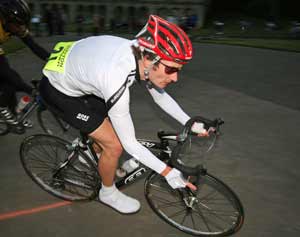 Dave teeters on the limit |
Ask yourself the question – how many bends have I negotiated on my ride today? Then try to estimate what that figure would be multiplied by the total number of rides in your cycling history. One heck of a lot. So let’s make this a bit more manageable and just concentrate on the number of bends ridden in the wet. Now the easy bit; how many times have you fallen off whilst training or racing taking those bends? The answer is very few; probably fewer than you could count on one hand. Yet I would not mind betting that every time your journey encounters a bend in the wet, there is some part of your brain that registers a momentary doubt as to your safety.
Why? It would seem irrational and unnecessary, considering the odds of falling off. Yet, on the immediate approach to the bend or even some way before, an alarm bell rings. Some inner resistance is becoming apparent; an unseen barrier is up ahead. We all know that going too fast around a corner can have unhappy consequences but does this knowledge justify our level of concern? Why, for some people, does this worry destroy their ability to negotiate these features efficiently, while for others every bend is a challenge to be enjoyed and mastered whatever the supposed risk?
Perhaps one’s earliest experiences must play a part here. Who could forget learning to cycle whilst being held upright by a parent or those dreaded stabilisers, which somehow had you permanently pitched at a drunken angle? Surely these experiences must have left their mark. Is there a direct relationship between the time spent at this embryonic stage of your confidence development and the prowess you are able to obtain naturally on the bike? Certainly, one’s technique suffers when these doubts and crises occur. Self preservation thankfully keeps this emotional turmoil in check most of the time. Only rarely do we override these safeguards and make the potentially fatal decision to brake sharply mid corner.
The old adage of practice makes perfect would seem most appropriate here. Taking a bend time and time again must improve one’s technique. As must accessing a tyre’s level of grip, consideration of the angles of lean one can achieve, weight distribution, tyre pressures… these are all part of the mechanics of cornering. Yet even if this information was available to you in forensic detail, the doubts would still be there. The demons cannot be banished by science alone! Watch the Tour de France as riders descend off a mountain. At first they all appear to be close in line, but gradually a gap is appearing. The rider behind can not hold the wheel. His confidence is blown; apprehension, uncertainty come in to play. There can be no other reason for this backing off.
To use another old adage, the best climbers are often the worst descenders. Are the riders who can seemingly corner quicker than everyone else, particularly in the wet, blessed with some unique physical attribute? [Two actually: skill and bravery – ed.] Is there some quirk to their method that simply eludes others, or are we all limited in our abilities by the amount of confidence that we can amass. Perhaps this is why some people are simply better than others – or is fast cornering simply a gift?





